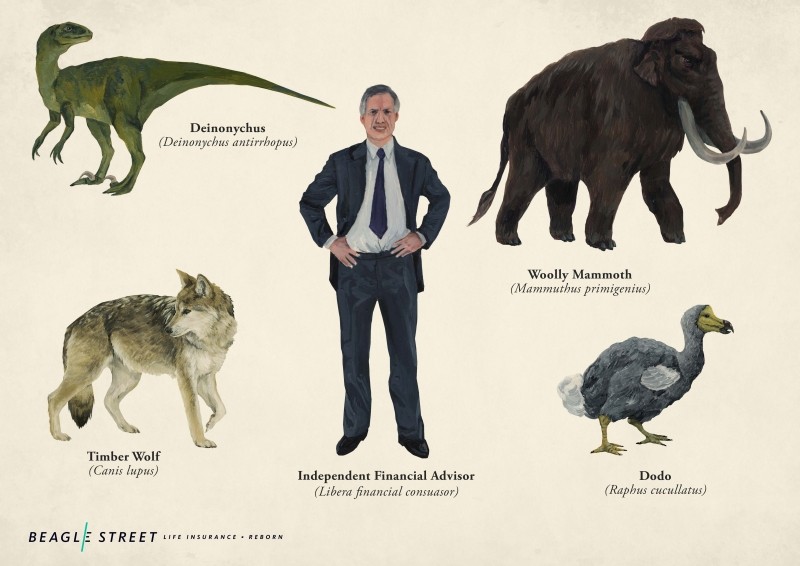Are Financial Advisors Becoming Dinosaurs
Post on: 10 Апрель, 2015 No Comment

Today Investors have a lot of financial information available at their fingertips that was simply nonexistent just 20 years ago. In fact, the website you’re reading this article on probably wasn’t even thought of yet. Buying your own stock through a discount brokerage house wasn’t an option. Tuning into televised business news 24 hours a day to look at the futures market was just a dream. Retrieving a stock quote and buying or selling a stock from your mobile phone: are you serious. Your dad’s portfolio was likely only as good as his financial advisor or, more accurately, his stockbroker.
Needless to say, today’s investing world is a far cry from back in the day. Investment houses, brokerages companies and major corporations have all adapted with the ongoing shift in technology. Financial vehicles such as targeted date retirement funds, exchange traded funds, online financial advisors and passive index funds have emerged as investment services for everyone. New companies like Financial Engines (FNGN ) are dedicated to providing millions of Americans with advice for their 401k and other retirement accounts. Given this radical shift in just the last few decades, one has to wonder if financial advisors are becoming a thing of the past.
Part of the move from financial advisors has to do with personal preferences and lifestyle. Many Americans simply do not have the time or desire to learn about investments. Some believe, perhaps correctly, that investing is becoming riskier and more complicated than it was a decade ago. The days of buying a single stock and retiring from capital gains and dividends over a lifetime are incredibly rare. Living in a highly globalized economy means issues that surface overseas have meaningful impacts on domestic markets. Exogenous shocks such as terrorism attacks, hurricanes, Ebola, and other unplanned events are hard to anticipate and understanding their impact on investments and retirement savings is even harder. (For more, see: A Guide to Choosing the Best Robo-Advisor .)
Focus on the Wealthy
Meanwhile, many individuals who have inherited large sums of money will likely rely on a financial advisor or planner to assist with their wealth management. For some, having a professional advisor who navigates today’s complex markets and provides human interaction when discussing personal financial goals is priceless, or at least worth a yearly expense fee. Perhaps that is a reason that the financial planner career path is growing 27% more than average professions according to a recent Bureau of Labor Statistics study.
Loading the player.
On the other hand, one has to examine and scrutinize the advice being given by a professional financial advisor. The reality is that most financial advisors and professional money managers do not beat the S&P 500 and other major stock indexes, so you’re spending hard-earned money for underperformance. In the case of expense-based advice, you’re paying at least 1 percent yearly on your nest egg. Although that 1 percent may appear minimal at first, it adds up when applied over a lifetime.
The expense-based fee bring up another point: most advisors tend to focus on high net worth clients. According to Phoenix Marketing International study of households in the United States, only 1 in every 20 households have $1 million or more in investable assets. This is not to say advisors ignore their middle class clients, but if their pay is tied to total managed assets, it’s conceivable that they will hone in on the rich and ultra-wealthy.

Do-It-Yourself Investing
Those without millions in assets can create their own mutual funds for less than the cost of hiring a financial advisor with low-cost index funds and exchange traded funds that mirror the overall indexes. Creative new investment vehicles are allowing individual investors to chart their own course. Target-date funds are hybrid mutual funds with a pre-allocated mix of stocks and bonds that factor in your estimated year of retirement. These funds use the same logic as an advisor— i.e. the nearer you are to retiring, the less risky your investment allocation should be and vice versa—but at reasonable fees. Plus, in theory, since you aren’t likely to change your retirement age drastically, you won’t face potential fee-incurring asset reallocation or money shuffling based upon your financial planner’s advice.
The Bottom Line
At the end of the day, financial advisors aren’t going to be extinct anytime soon, but having one isn’t a guarantee of financial success either. Investors are ultimately responsible for their own financial decisions, including selecting the right financial advisor. Getting a professional to assist with money management makes sense for a lot of people, but be mindful of the advice you receive. Do your homework on the advisors and their recommendations. Also, keep in mind that there are many inexpensive do-it-yourself options. By simply leveraging the Internet and investor-friendly websites, a novice or beginner can come up to speed and become a more informed and intelligent investor.














